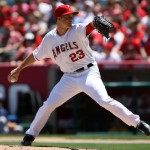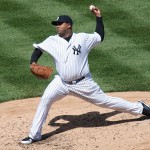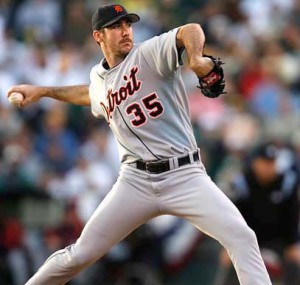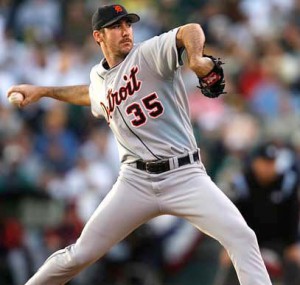
Greinke bolstered the Dodger’s already strong rotation. How much? Photo Jeff Golden/Getty Images
(Editor Note: I’ve had the bulk of this post written for weeks and have been waiting for the last couple of impact FA starters to sign. I’m tired of waiting. If/when guys like Kyle Lohse, Shawn Marcum or Joe Saunders signs, or if there’s another big trade that happens, perhaps I’ll re-post this).
On December 5th, awash in the after-glow of the Dan Haren acquisition, I postulated that the Washington Nationals’ 2013 rotation was the Best in the Majors.
That was before the next shoe dropped in the Los Angeles Dodger’s unbelievable spending spree in 2012: signing Zack Greinke to a 6yr/$147M contract. This is the 2nd largest starting pitcher contract ever signed (just behind CC Sabathia‘s 7yr/$161M deal that he opted out of to sign a slightly larger deal in terms of AAV after the 2012 season). These rankings also are updated for the highly-criticized James Shields (and parts) for Wil Myers (and parts) deal, the Ryan Dempster signing.
The larger story behind the Greinke signing remains the unbelievable payroll Los Angeles will be sporting in 2013; they’ll spend roughly $225M in 2013, breaking the Yankees record by a 10% margin, and all boldly in the face of a dollar-for-dollar luxury tax. And they’re likely not done yet on the FA market. But the focus of this article is a revisiting of baseball’s best rotations, now that Greinke is in the Dodger’s fold.
Instead of trying to figure out which handful of teams are the best, why not rank all 30 rotations? With the help of some Depth Chart websites (ESPN, rotoworld, mlbdepthcharts, and some good old-fashioned baseball-reference.com), here’s my rankings of the 30 rotations as they stand for 2013, right now. For the sake of this ranking, I am trying to take a reasonable expectations case for each of the pitchers on each team, as opposed to a “best case” for each team (this is most important when considering San Francisco’s rotation). I’m also not considering “depth,” just the Ace through 5th starter (this is important when judging Washington especially).
Note: a couple of other National writers have done similar analysis, with David Schoenfield‘s NL-only rankings on his Sweetspot blog back in November and Buster Olney‘s top-10 in the MLB rankings here. By and large the rankings match up, with a couple of different .
Discussion on each rotation is below the rankings.
- Washington: Strasburg, Gonzalez, Zimmermann, Haren, Detwiler
- Detroit: Verlander, Fister, Sanchez, Scherzer, Porcello (with rookies Smyly, Crosby, Wilk awaiting)
- Los Angeles Dodgers: Kershaw, Greinke, Beckett, Harang, Capuano (with Ryu, Lilly, Billingsley in the wings)
- Toronto: Dickey, Morrow, Johnson, Buehrle, Romero with Happ/Laffey/Drabeck/Huchinson in the wings.
- San Francisco: Cain, Lincecum, Bumgarner, Vogelsong, Zito.
- Tampa Bay: Price, Hellickson, Moore, Niemann and one from Cobb/Archer. Possibly Odorizzi and Montgomery now in the mix too.
- Philadelphia: Halladay, Hamels, Lee, Kendrick, Lannan (with Cloyd/Pettibone/Hyatt as backups)
- St. Louis: Carpenter, Wainwright, Westbrook, and probably Lynn and Garcia (Kelly/Miller if Garcia is not ready)
- Cincinnati: Cueto, Latos, Bailey, Arroyo, Leake (possibly Chapman?)
- Arizona: Kennedy, McCarthy, Cahill, Miley, and one from Skaggs/Collmenter
- Atlanta: Medlen, Hudson, Minor, Maholm, and one from Beachy/Delgado/Tehran
- Texas: Darvish, Harrison, Holland, Ogando and likely a FA pick up. (Perez for now)
- Los Angeles Angels: Weaver, Wilson, Vargas, Hanson, Blanton (wth Richards/Cassevah for depth).
- Oakland: Anderson, Griffen, Parker, Colon, Milone, with Straily/Blackley/Ross/Godfrey in the wings.
- Chicago White Sox: Sale, Peavy, Danks, Floyd, Quintana
- New York Yankees: Sabathia, Kuroda, Pettitte, Nova, Hughes/Phelps. What about Pineda?
- Boston: Lester, Buchholz, Dempster, Lackey, and 1 from Doubront/Morales/ De La Rosa.
- Baltimore: Hammel, Chen, Tillman, Gonzalez, Britton (perhaps Bundy)
- Chicago Cubs: Garza, Samardzija, Jackson, Wood, and one from Baker/Feldman/Villanueva (likely two if Garza is still injured or is traded). They also just signed Dontrelle Willis to a minor league deal.
- Kansas City: Shields, Guthrie, Santana, Davis, Chen (Hochevar, Moscoso?)
- Seattle: Hernandez, Iwakuma, Ramirez, Beavan (Hultzen?). Bonderman on a reclamation project.
- Pittsburgh: Burnett, Liriano, Rodriguez, McDonald, Locke, McPherson
- Milwaukee: Gallardo, Estrada, Fiers, Narveson, Rogers (with the likes of Peralta and Thornberg waiting if Narveson cannot go).
- Minnesota: Diamond, Worley, Correia, Pelfrey (if he’s healthy), Hendricks, Duensing, De Vries (maybe Gibson or May? ). Harden on a reclamation project.
- New York Mets: Santana, Niese, Gee, Harvey, and who knows.
- Cleveland: Jimenez, Masterson, McAllister, Kluber, Carrasco, Bauer (Kazmir and Myers on reclamation projects)
- Colorado: De La Rosa, Chacin, Pomeranz, Nicaso, Francis (and newly acquired Rosenbaum perhaps?)
- San Diego: Volquez, Richard, Marquis, Stults, Ross
- Miami: Nolasco, Alvarez, LeBlanc, Eovaldi, Turner, Maine?
- Houston: Norris, Humber, Ely, White, Harrell, Lyles (who, who and who?)
Free Agents as of 1/2/13 that could impact the above list: Lohse, Marcum, Saunders, Lowe. Also guys like Webb, Vazquez and Pavano could be coming out of retirement but likely won’t make much of an impact.
Rumored trades as of 12/31/12 that could impact this list: Harang, Capuano, Masterson, Smyly/Porcello.
Hmm. I seem to favor NL teams. The majority of my top Ten rotations are in the NL. Is this bias? Discussion, 1-30
- Washington: If Dan Haren returns to 2011 form, which I’m assuming he will, this is the best rotation in the majors. Not the deepest though; if we lose someone to injury we could struggle to repeat 2012’s win total. But this is an exercise to determine the best 1 through 5, not to determine depth (where teams like the Dodgers and Tampa clearly have more depth). I will say, this is a close race at the top; I can see arguments for any of the top 4-5 to be the best rotation. I don’t want to be accused of homerism by ranking the Nats #1, but can make a man-for-man argument that shows we should be #1 above the next several competitors.
- Detroit’s rotation in the post season was fantastic against New York, then god-awful against San Francisco. Why? What can they change in 2013? They better figure it out, because upon re-signing Anibel Sanchez they’re rolling the dice on the same big 4 in 2013. Fister and Scherzer are slightly underrated but showed how dominant they can be in the playoffs. The #5 starter is likely where Detroit falls to Washington; Detwiler’s 12th ranked ERA+ in 2012 will trump nearly every other #5 starter in the league.
- The Los Angeles Dodgers has an Ace in Clayton Kershaw, a near-Ace (in my opinion) in Zack Greinke, a potential near-ace career reclamation project in Josh Beckett, and then a bunch of question marks. Two rotation stalwarts Ted Lilly and Chad Billingsley remain injury question marks for 2013, and the rest of their rotation right now are league average hurlers. I believe their pitchers get a bump in adjusted ERA by virtue of their home park, thus I don’t believe their current #4/#5s match up as well with Washington’s or Detroit’s, putting them in 3rd place. Plus Beckett is a question mark; is he throwing like he did at the end of 2012, or is he the Fried-Chicken eating malcontent he has been in Boston the last couple of years?
- Toronto: Its not every day you can trade for 4 starting players, including two rotation members. But thanks to Miami’s salary dump, Toronto finds itself with a significantly improved rotation. If Josh Johnson returns to Ace form, coupled with Brandon Morrow’s fantastic 2012 performance and Mark Buehrle’s solid #3 stuff, they have something to build on. The subsequent acqusition of 2012 Cy Young award winner R.A. Dickey changes things though, valulting Toronto into the discussion for best AL rotation.
- San Francisco has won two World Series’ in three years with the same core of hurlers, and there’s no reason to think they won’t continue to be amongst the elite in the league. The question remains though; what are they getting from Tim Lincecum in 2013? Is the other shoe going to drop on Ryan Vogelsong‘s fairy tale career resurgence? And, can Barry Zito continue his career rebound? If the best-case falls for Lincecum and Zito (Lincecum returns to Cy Young form and Zito pitches even marginally ok) then I think they’re the best rotation in the game. As it stands though, i’m assuming that both guys fall somewhere short of the best case, meaning that they’re “only” the 5th best rotation in the game.
- Tampa Bay has well-known pitching depth, and even with the move/heist of the James Shields trade they have a ton of guys who other teams would love to have. Expect a bounce-back sophomore campaign from Matt Moore and more excellent innings from rising hurlers Alex Cobb and Chris Archer. They may not be the best rotation in the game, but they’re certainly the most value for the dollar.
- Philadelphia’s big 3 are all fantastic, but are showing signs of age. Roy Halladay only had an 89 ERA+ last year; has age caught up to him? The drop-off after the big 3 is significant too. But the potential of the big 3 keeps this rotation among the league’s elite. The acquisition of John Lannan didn’t affect their ranking much; he merely replaces the Phillies heading into 2013 with a rookie in the #5 spot. I had Philadelphia lower in the earlier drafts of these rankings, and have them this high on the assumption that their big three are all entering 2013 healthy.
- St Louis’s 2012 rotation was rich enough this year to drop 18-game winner Lance Lynn to the bullpen. With Chris Carpenter healthy in 2013, with Adam Wainwright recovered from Tommy John, and with the likes of hard-throwing Joe Kelly or Shelby Miller as your #5 starter, this could be a scary rotation. And that’s if Jaime Garcia isn’t ready for the start of the season after injuring his shoulder in the playoffs. Kelly/Rosenthal are serious arms though and give far more depth than what a team like Washington has. Some pundits are not as high on the ability of Carpenter to return to his career form, pushing this ranking slightly lower than I initially had them. It all comes down to the health of their 1-2 punch; if Carpenter and Wainwright pitch like Cy Young candidates, this rotation gets pushed up much higher.
- Cincinnati’s 5 starters took every 2012 start except ONE (the back half of an August double header). In today’s baseball landscape, that’s nothing short of amazing. Mike Leake may not be the strongest #5, but Cincy’s 1-2-3 put up great numbers pitching in a bandbox in Cincinnati. I’m not the biggest Mat Latos fan, but his 2012 performance spoke for itself. Lastly, there’s rumors that Aroldis Chapman may be moving to the rotation, pushing Leake presumably to a swing-man role. If Chapman can repeat his K/9 performance in a starter role, this rotation is even more formidable. Should it be higher? Perhaps; in previous drafts I had them in the top 5, but I just can’t seem to give their top guys the same “Ace” billing as other leading arms above them on this list.
- Arizona‘s acquisition of Brandon McCarthy is a great one for me; if the Nats hadn’t bought Haren, I thought this guy would fit in perfectly. Arizona has a solid 1-4 and (like Atlanta) has a slew of options for #5. And, they have help in the immediate future, with Daniel Hudson coming back from July 2012 TJ surgery and a top prospect in AA. I see them as a solid rotation 1 through 5 but without the blow-away ace that other top rotations have.
- Atlanta’s found gold in Kris Medlen gives Atlanta enough depth to trade away starters (the Tommy Hanson for Jordan Walden deal). They have 4 good starters and then can pick from 3 top-end prospects for the 5th starter until Brandon Beachy is back from surgery. What pushes this rotation down in the rankings is the unknown; is Tim Hudson getting too old? And what kind of performance can we expect from Medlen realistically? Can he really continue to pitch like Bob Gibson in 1968? Their 3/4/5 guys don’t scare me right now, but the potential of 1 and 2 keep them ranked decently high.
- Texas bought an ace last off-season in Yu Darvish, has a couple of good arms developed in house in Holland and Harrison, but has been depending on one-off FAs to fill the void. They need a full healthy year out of their two upper-end arms Alexi Ogando and/or Neftali Feliz to make the leap. Felix is out for most of 2013 though after getting Tommy John surgery in August. Colby Lewis is in the fold but seems like he’s out most of 2013 after elbow surgery late last season. If they buy another decent FA this off-season (Lohse?), this rotation works its way further up. I have a hard time seeing them at #12, but who above them on this list right now do you push them ahead of?
- The Los Angeles Angels have a great 1-2 punch in Weaver and Wilson, but they’ve spent the off-season watching their former envious rotation erode. Hanson is an arm injury waiting to happen, Blanton has been pitching below replacement level for 3 years, and they don’t have an established #5 right now. Perhaps this rotation should be lower. The shrewd trade for Jason Vargas helps keep them in the upper-half of the league, based on who their planned #4/#5 guys are.
- Oakland’s slew of young, cost contained and quality starters is the envy of the league. The only thing that keeps this list from greater acclaim is Oakland’s relative lack of recent success (2012 not withstanding). Throw in a couple more playoff appearances and Billy Beane can get a sequel to Moneyball published. Like the LA and SF rotation, they benefit from their home park, but that doesn’t take away the fact that they won the division last year. The off-season isn’t over either; I can still see Beane flipping one or more of his rotation for more depth/more hitting and turning to his stable of youngsters again. I’m not necessarily happy with this ranking spot and feel like it should be higher, but their collection of unknowns doesn’t inspire the confidence of the known Aces above them on this list.
- The Chicago White Sox have a big up and coming potenial Ace in the making in Chris Sale and the engimatic Jake Peavy. After that are some league average options. Jose Quintana had a great 2012; can he repeat his success? I feel like the 3/4/5 guys in this rotation are all quality, innings eater types, but nothing that really knocks your socks off. Middle of the pack feels right.
- The New York Yankees continue to get 95+ win teams with a smoke-and-mirror job in the rotation. Now they set to go into 2013 with one possibly injured Ace and two guys nearly 40 as their 1-2-3. Is 2013 the year the wheels come off the bus for New York? A healthy Michael Pineda contributing as the #2 starter he can be would vastly improve the outlook here.
- Boston‘s ranking may be changing significantly, depending on which arms they buy up off the FA market. I think a new manager helps Lester and Buchholz regain their near-Ace form of yesteryear, and Dempster should give them competent innings in the middle of the rotation. But I can’t assume anything when it comes to their 1/2; they’ve both been so good and so bad in the recent past.
- Baltimore amazingly comes in ranked this low despite making the playoffs last year with this collection of no-name starters. Maybe i’m underselling their 1-2-3 capabilities. Maybe i’m just treating them like a team that had a pythagorean record of 82-80.
- The Chicago Cubs still seem set to be in “sell mode,” so listing Garza as their Ace seems fleeting. Behind Garza though are a collection of hard throwing, promising guys. I like Samardzija, the Edwin Jackson acquisition gives them a solid #4. Perhaps this rotation should be slightly higher on potential.
- Kansas City made their big trade to acquire an “Ace” … and only got James Shields. I mean, Shields is good .. but not that good. He’s only got a career 107 ERA+, but he is a healthy workhorse. Behind Sheilds is a collection of guys who mostly are #4 and #5 starters elsewhere, which means this rotation is … below average.
- Seattle should have been higher than the teams directly ahead of them on this list just by virtue of the quality of Felix Hernandez … but then they went and traded away Vargas, and seem to have no good ideas on the back end of their rotation right now. This team could be in trouble.
- Pittsburgh is getting by on veteran starters who have the ability to look good, and may not deserve this high of a ranking. AJ Burnett had a great first half but settled back down to average in 2012. Here’s a great stat: Burnett is getting paid $16.5M a year … and has *never* made an all star team in his career.
- Milwaukee seems like they should be higher with a guy like Gallardo leading the ranks. But their #2 is Marco Estrada, a guy who couldn’t make Washington’s rotation in the years when we didn’t HAVE a rotation. I know Fiers is good; perhaps this rotation should be higher.
- Minnesota‘s rotation looks pretty poor right now; their ace is a guy whose a #3 on most teams (Scott Diamond) and they’re hoping for one of their injury reclamation projects to pan out. It could be a long season in Minneapolis.
- The New York Mets rotation could be better than 25th, if Santana isn’t allowed to throw 150 pitches pursuing a no-hitter and if Niese pitches up to his capability. However, Santana hasn’t had an injury-free season since 2008, and I’m not betting on it in 2013. They are planning on giving both the 4/5 slots to rookies, meaning there could be some long series for this team in 2013. Their fate was sealed when they traded away their Cy Young winning Ace, and the statement was made about the direction of the franchise.
From 26-30, I honestly don’t see much of a difference between these rotations. Really the only argument was to figure out which rotation of no-names between Miami and Houston was dead-last. I selected Houston for the time being; if/when Miami trades Ricky Nolasco for 40 cents on the dollar, we’ll feel free to rank them 30th.
At the end of this massive posting, I can honestly say that the difference between the 5th ranked rotation and the 6th is often near nothing. Looking back, I can see anyone from the 5-8 range being listed in any order and I’d agree with it. I ranked and re-ranked these rotations over and over again from the time I started writing this post in early December to the time i’ve posted it. Perhaps it would have been easier to just have groupings of rotations instead of a pure ranking 1-30. But, that would have been a copout.
I look forward to your opinions and arguments for some rotations to be higher/lower than others.



